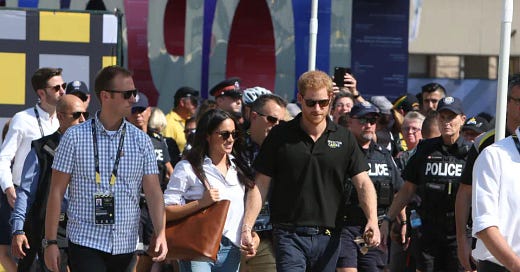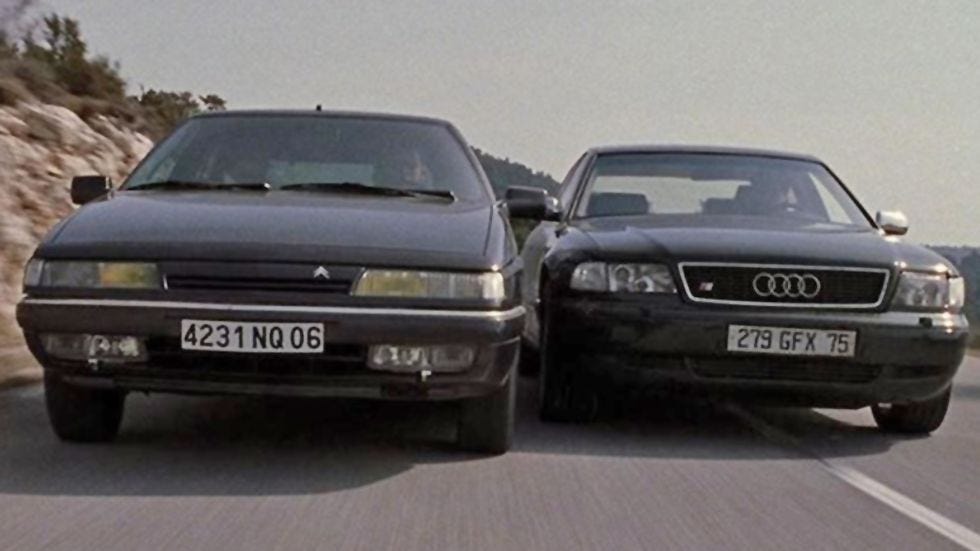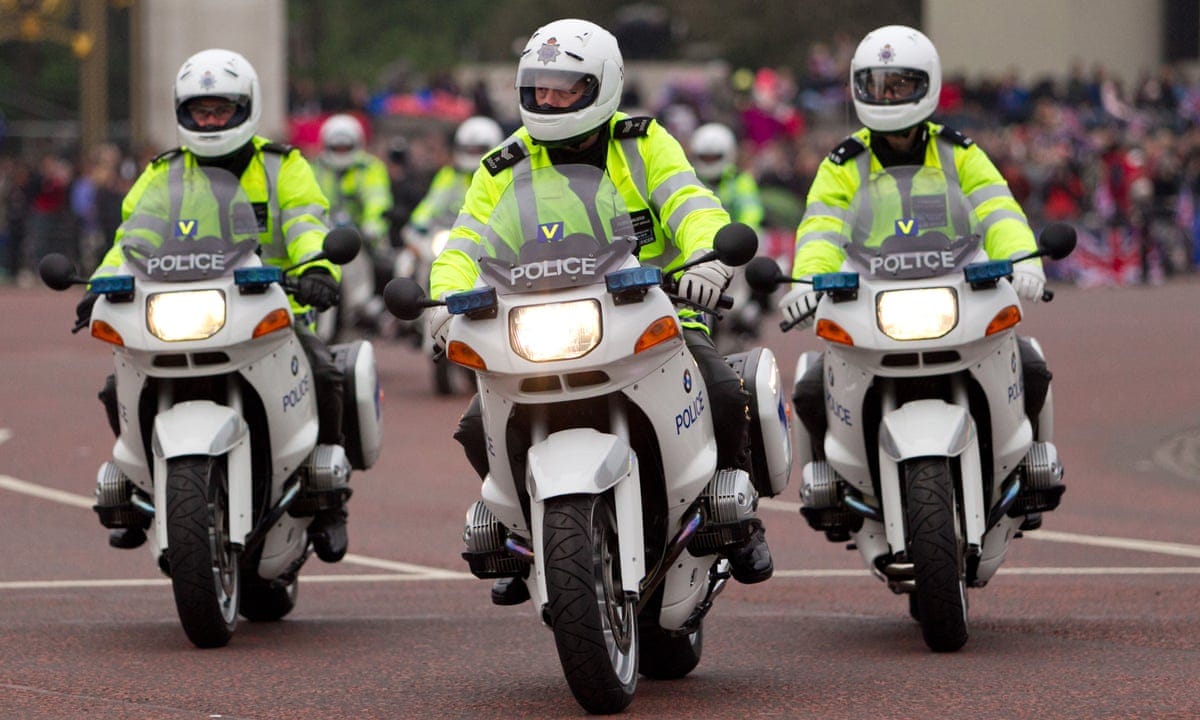The Duke of Sussex knows there’s no real substitute for police protection
I followed the news of Prince Harry’s car chase across Manhattan with interest. I’ve spent a fair bit of time sitting in New York traffic, so assumed the only people capable of arranging a car chase in the ever-congested Big Apple were Hollywood movie producers.
Now, I’m not suggesting Harry doesn’t have valid security concerns - of course he does. I also appreciate how the perception of threat is impacted by trauma; you’d need a heart of stone not to sympathise with someone whose mother died being pursued by paparazzi photographers. Of course Harry would be hyper-alert to a scenario such as the one that unfolded in New York.
Nonetheless, the allegation will (and has) been made that the timing is convenient – he’s currently challenging a decision not to provide the Sussexes with police protection when they visit the UK. Harry’s even offered to pay, his lawyers having discovered an arcane provision under the Police Act 1996 whereby a chief constable can charge for ‘special police services’. I suspect this was intended to cover events like football matches, but Harry’s legal team have decided to (as we used to say in the police) ‘give it a run.’
Spoiler: He’s going to lose.
I’m not sure the British public are ready for a ruling which would allow the international mega-rich to hire themselves tooled-up coppers in armoured Jaguars for the weekend. I also suspect the judge won’t appreciate the performative outrage coming from the Sussex camp over events in New York. So, although recollections may vary, I’ve come to the conclusion there’s a pudding being over-egged here.
Nonetheless, Harry’s insistence on having Metropolitan Police Protection when he visits the UK begs the question; why the police? The UK is blessed with legions of private security providers, many of who are ex-police protection officers (not to mention the gnarly ex-military types who make up the informal security ‘Circuit’ protecting wealthy overseas customers).
So this week I’m going to unpack the real reason why Harry’s craves UK police protection - provided by the Met’s RaSP (Royalty and Specialist Protection) department.
This is where I usually provide my bona fides - but this time it’s slightly different as I’ve never been a protection officer. With my mouth? I’d have lasted five minutes in a car with the average politician. I have, however, picked up some understanding by osmosis - many contemporaries from special branch joined the then ‘A’ Squad (Protection), some going on to spend most of their careers as protection officers. We’ve broken bread over the years, spending many hours discussing the job. If you’re hoping for some gossip, by the way, I’m going to have to disappoint; most of the ‘Prot’ officers I know are extremely discreet. And, on the rare occasions they aren’t, I’m not minded to betray their trust.
Anyhow, I’m sure if I’ve made any mistakes in this article my old Prot friends will put me right.
Oh yes, they will.
This article is also informed by my freak attendance on the National Protection Driver’s Course, where I was taught how to drive like a bodyguard. It made me realise why Prince Harry might not want to relinquish the ‘particular set of skills’ offered by RaSP - although not perhaps for the reasons you might expect.
I’ll come to that later.
‘Drive it like you nicked it!’ 99% of policing is routine, but occasionally there are ‘Ronin’ moments where they pay you to crash cars and live the action movie dream
First, a little (recent) history. Police protection in the Met used to come in two specific flavours. The first was SO14 (Royalty). The second was SO12 (Special Branch, who protected politicians and other Ravec-nominated persons). Organisational distinctions aside, there was a crucial difference between their operating models;
(1) The Royal Household works to a meticulously-planned schedule. If you wanted to know what the King’s doing on August 12th the year after next, I’m fairly sure it’s already in the diary. It’s in the RaSP duties office diary, too.
(2) Politicians? Given the current clown show in Westminster, we might have gone through a couple of prime ministers by next Thursday, let alone the year after next. This is another headache for the police, by the way - former UK PMs all receive protection for life after leaving office. You can’t just defrost a new packet of bodyguards either - the training pipeline is demanding and lengthy.
And so Royalty Protection officers worked a more predictable shift model, whereas Special Branch officers were required to be more flexible. The Foreign Secretary, for example, has a diary but events will get in the way - wars, international emergencies, domestic political crises. I’m sure officers from both sides might offer a view on how this impacted on their unit culture, but the general feeling was Royalty Protection was more formally structured and rank-conscious. Royal bodyguards became, almost by default, part of the Royal Household. To more than a few politicians, Special Branch officers were those pesky cops in the back of the car.
Incidentally, I’ve met several of Prince Harry’s bodyguards from when he was a younger man, all of who thought he was a thoroughly nice guy. I’ve no doubt the positive relationships he enjoyed with such officers informs his desire to have his protection restored.
Eventually, after a number of reorganisations of the sort the Met excel at (ha ha), protection functions were brigaded into a single department - RaSP. Some of the older guys lamented the changes; they worry protection has become more of a firearms department in plainclothes, as opposed to a plainclothes department required to carry firearms. They despair of the senior officers passing through to evidence running a firearms command, or managers who saw RaSP as a vehicle for ‘protection tourism’ - the practice of filling their boots with foreign trips for spurious reasons.
Yet the British protection model survived. This is based on the principle of anticipating problems and, in doing so, avoiding them. It’s about being low-key. It’s about planning, persuasion and interpersonal relationships. I remember being told how one leading politician was stunned when he arrived in a foreign country to discover the protection team had already scouted the location, liaised with local police, reconnoitred his accommodation and generally made his trip run like clockwork. Protection officers call this an ‘advance’. It had never occurred to the politician how much work goes into making sure… nothing happens. A good protection officer is a purveyor of normality. An extinguisher of risk. Boring is safe, and safe is good.
On the very rare occasions things go kinetic, protection officers have to put on a totally different hat. Most of the bodyguards I know defy the gung-ho, slightly thick stereotype portrayed in popular culture (although not all of them, as a job offering overtime, guns and an element of glamour will always attract the occasional Walter Mitty). And, being British, they tend to escalate force proportionately. I’ve seen Met protection officers go hands-on rather than pull guns, because they correctly assessed and reacted to the threat.
Again, for Harry, a model relying on discretion will be important. He lives in America, where the protection model - including the private sector - is more robust. It’s based on deterring and repelling threat through the projection of force. You can read about my brief encounter with the US Secret Service here.
So I fully understand the appeal of the British model for Harry.
The US protection model isn’t known for subtlety
The other obvious advantage of having police protection is the 50,000 people working for the MPS. RaSP can call on counter-ambush teams, riflemen, counter-reconnaissance operators, traffic officers, CCTV and any number of other assets. Furthermore, the MPS is solid when it comes to intelligence. It even has a fixated person’s unit monitoring the obsessives who haunt the Royal Family. The UK’s extensive counterterrorism network is plugged into RaSP as and when necessary.
Even the best private operators can’t possibly hope to compete - although I’m sure they’re capable of providing high quality, discreet protection for clients such as the Sussexes. I suspect, for Harry, this isn’t the point. He’s acutely aware of the advantage of having a personal police officer to smooth the way. A private bodyguard has no real powers to speak of - a police protection officer holds the office of Constable.
Which leaves us with the question: should anyone be able to buy that service? I don’t think so. Armed state protection should be carefully considered and applied on the basis of need. Which is where Ravec comes in - and I genuinely feel their pain on this occasion. Ravec is the Home Office’s ‘Royal and VIP Executive Committee’ which decides who receives armed protection. I’ve spoken to a number of officers who’ve attended Ravec over the years, most of who describe the rock-and-a-hard-place the committee often finds itself in.
Ravec has to balance all sorts of delicate interests, both practical and political. Not to mention the cost of police protection is eye-watering. I’ve also found their argument in court concerning Harry’s appeal to be compelling. I believe, if a credible threat to the Sussexes on UK soil was put to Ravec, it would provide (temporary) armed police protection without batting an eyelid.
I think Harry knows this, too.
Why then, does he continue to litigate?
Which brings me back to my protection driver’s course. Back in 2006 or thereabouts, counterterrorist surveillance teams were having a rough time in inner-city areas. We had officers attacked and vehicles burned out. Not all of the attackers were terrorist suspects; much of it was simple lawlessness. Management, unsurprisingly, were concerned a surveillance officer might be forced to draw a firearm to protect themselves. To that end, they started putting surveillance staff - even support officers like me - on anti-hijack driving courses. Some of my work involved moving observation and technical support vehicles around surveillance plots. OP vehicle crews were particularly vulnerable in the event of compromise, cooped up in the back of vans with no driver. We ended up running security cars to protect them.
When they ran out of slots on the normal anti-hijack course, I was sent on the two-week National Protection Driving Course instead. The second week consisted of what they call 'bashing and crashing’ (i.e. antihijack and defensive driving). The first week dealt with convoy drills and planning. There were only two surveillance officers on my course, the rest being protection officers (and an RLC driver who’d been chauffeuring a general around Basra the week before).
I enjoyed the first week more than I thought I would. We studied famous ambushes and assassination attempts, like the Red Army Faction’s kidnap and subsequent murder of Hanns Martin Schleyer in 1977. Then we began convoy driving in central London, our vehicles uncomfortably close to prevent anyone forcing their way into our cavalcade. We thundered up and down motorways, learning how to exit and leave as a coherent group. We used powerful Range Rovers and BMWs, although there was a disappointing Saab on the fleet.
The second week was a full-on ‘Top Gear’ experience on an old airfield in Hertfordshire. The instructors were ridiculously talented, automotive hooligans who could do impossible things with the bashed-up Ford Scorpios and Vauxhall Omegas we drove practicing ‘J’ and ‘Y’ turns. Then, back at Hendon, we crashed through barricades made of old cars.
There was a final exercise. At 09.00 we escorted a VIP (in this case, a member of the police staff who was on their last working day before retirement) from the Hendon motor driving school in northwest London to Buckingham Palace.
The point of the exercise was to learn how to drive with the Special Escort Group (the SEG). That link, by the way, is fab if you’re interested in this sort of stuff.
The Special Escort Group; London traffic is the Red Sea… and they are Moses
The SEG were immaculate, their bikes gleaming white. They even parked with their (polished) front wheels all pointing in the same direction. It was the antithesis of the sort of policing I’d ever done, which made it all the more impressive. I was driving the advance car, which meant I was briefed by an SEG officer they call ‘The Easy Rider.’ “Right,” he said, “this is the only time you’ll hear this in your service; drive like you’re trying to nudge my rear tyre. If you do, it’s my fault. Okay?”
Keeping a tight formation is key - any vehicle entering the convoy will break it. Other SEG riders sped ahead of us, leap-frogging junction to junction to stop traffic. The SEG used long whistles to herald their arrival, which they insisted were easier for motorists to hear than sirens due to their high pitch.
It was like driving on a magic carpet.
We never exceeded the 30mph speed limit (a condition of the exercise) yet we made Hendon in suburban northwest London to Buckingham Palace in twelve minutes. That would easily be an hour without the SEG clearing the way.
Twelve. Bloody. Minutes. Maybe it’s only readers who suffer London traffic who’ll be impressed. I know I was. You couldn’t do that journey on blue lights in twelve minutes. Not at that time of day.
Now, what on earth does my dit about a long-ago driving course have to do with Prince Harry?
Well, I think you can work it out. From the VIP Windsor Suite at Heathrow, the Sussexes are met by quiet professionals with warrant cards. The ultimate deluxe concierge service. There’s no dicking around at security - just straight to the private carpark and a magic carpet ride to your central London hotel. No dramas or intrusion. These guys are cops. They’ve got guns and blue lights. Moped-riding paparazzi? RaSP can radio the traffic police and get ‘em stuck on for dangerous driving. That’s if they can keep up in the first place.
Harry grew up riding the magic carpet. He misses it badly. The product’s so good, in fact, he’s prepared to pay big bucks for it.
You know what? If I worked on RaSP, I think I’d be flattered.








Bang on Dominic. You put in to writing everything that has been racing through my mind re protection and these two. When you have spent most of your service delivering a fantastic product, it is irritating to read about anything less. I spent half of my service with The SEG, where only the best would do, mirrored by SO14(2) and SO12 colleagues. Thank you so much for writing this.
I like the cut of your job Dominic.
What an accurate read from start to finish, I could see a lot of the same people we worked with along the way from ‘S’ & ‘A’ Squads, Royalty and SEG. Best years of my life.
I particularly liked the term ‘Automotive Hooligans’ so accurate about the operators delivering those Courses, knowing them as I do.
Spot-on about H, he’s burnt his bridges, never to be rebuilt, sad really.